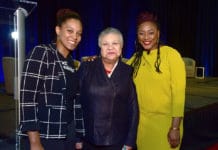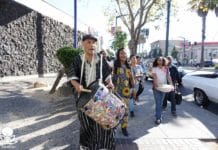
by The People’s Minister of Information JR
One of the most elegantly curated film and art festivals, the Matatu, is here once again with a glamorous international offering of film, culture, dance, cuisine, music, thought and more. Curator Michael Orange is on the cutting edge of mixing artistic genres to bring new perspectives together with new audiences to nurture new ideas into new realities.
We have lived in the past metaphysically for too long. Now it is time to nosedive into the future to start on the creation of the “New Us.”
M.O.I. JR: What year is this for the Matatu Film Festival? How has it been going?
Michael Orange: We started in 2012, so this is the seventh year. We presented our first festival in 2012 along with an inquiry – written with Chinaka Hodge – on the privatized utility of festivals, often funded by land developers, for the eventual annexation of local places by foreign people. We referenced the Treasure Island Music Festival, not knowing at all that longtime residents would be evicted in five years for the expansion of San Francisco. I mean, calling it a festival was always a sort of an inside joke, really.
Since then, each year of our festival has mimicked the migratory journey in the respective themes of Leaving, Drifting, Approaching, Arriving, Assimilating and Becoming a Local. We reclaimed our identity, now in our seventh year, repositioning the festival as an “Expression.”
While we’ve presented performances and screenings over four to six weeks in years past, we’ve tethered this year’s programs more closely in sequential evenings composing: A Global Expression in Five Sentiments.
Our archivist, Zoé Samudzi (Zimbabwe), has prepared accompanying language, and our art director Julie Munsayac (Phillippines) will introduce new branding over the next year. We call these “Impressions,” or their own interpretations of my work as curator.
Collectively as an outfit, and the nearly 36 filmmakers, poets, musicians, chefs, ballet dancers and comedians we’ve invited aboard, we’ve poured our hearts into this expression and hope folk will come along for the journey once more.
M.O.I. JR: Can you talk about what you have going on this year?
Michael Orange: I was doing a lot of reading on positionality and self-observation before planning this year’s expression. So much of our identity as Black Americans is rooted in our love-hate relationship with the colonial father. I mean, they’re still here and we’re still here.
It seemed to me that a great deal of what we carry as “the struggle” is a burden similarly endured by racialized peoples across the world. With that in mind, I felt like it might make sense to put our own selves down for a moment in order to have a look at the colonial father from another position.
So, in addition to stories presented by artists from Jamaica, Haiti, Nigeria, Senegal and Sudan, we’ll also present stories by artists from Cambodia, India, Laos, Lebanon, Palestine and Syria.
As I mentioned, we’re consolidating the programs this year, so rather than four separate, yet closely connected, programs having four separate tickets, they’ve been woven together and presented as one sentiment with one ticket. Four of the five programs begin with dinners prepared by four of Oakland’s celebrity chefs representing Barbados, Cambodia, Syria-Palestine and the USA.
On Sunday, Sept. 22, the first sentiment looks at West Asia, or what the colonial father calls “The Middle East,” as in their minds and our submission, everything must be a function of their centered position. We’ve featured stories like “Nasser’s Republic” in the past, which looked at an enduring campaign to dissolve the region for the benefit of oil interests. We also screened Evaporating Borders in 2012, which looked at the nation of Cyprus as an entry to the European Union.
We’re super pleased this year to present Chef Reem Assil along with the North American premiere of Rania Lee Khalil’s performative cinema piece “Third World Trilogy Project” that includes “The Palestinian Wildlife Series”; “The Pan African Asian Women’s Organization, Cairo and Conakry 1960-1965”; and “Sanai: a story i tell to my daughter.” Following the screening, Palestine’s 47SOUL will perform. So that’ll be a dance party.
On Monday, Sept. 23, the second sentiment looks at movements of people through dance on the African continent – particularly the nations of Senegal and North Sudan. Afro-Vegan Chef Bryant Terry prepares a vegan dinner for 50 guests, which is followed by the North American premiere of “Call to Dance: Senegal,” a film I’ve been following over the last few years featuring a variety of modern dance crews throughout Senegal. Once the film concludes, Adji Cissoko (Senegalese father) and Shuaib Elhassan (Sudanese father) of Alonzo King LINES Ballet perform a newly choreographed work.

Thursday, Sept. 26, is the cornerstone of this year’s expression, a collaboration between myself and Congolese-Belgian musician and activist, Zap Mama. We began drafting ideas earlier in the year and met on commemorating Patrice Lumumba, who was murdered by colonial fathers of the United States. The evening begins with a screening of Raoul Peck’s “Lumumba: Death of a Prophet,” which is followed by a percussive response by Marshall R. Trammell. Zap Mama is joined in conversation by our archivist Zoé Samudzi before offering a one-woman-show response to the film and legacy of Patrice Lumumba.
We travel to South and Southeast Asia on Friday, Sept. 27, for a long look at the West. Chef Nite Yun (Cambodia) of Nyum Bai, Time Magazine’s Top 100 Places in the World, prepares a dinner which is followed by the California premiere of “LaoMagination,” presented by Laotian poets Bryan Thao Worra and Kaysone Syonesa. South Asian comedian Hari Kondabolu performs right after and then we’ll feature “Tropitaal: a Desi Latino Soundclash!” which documents the shared histories of migration and resistance of South Asian and Caribbean peoples – on the dance floor. We work with Anjali and Stephen twice a year as it’s one of the most fun parties I’ve ever attended.
The capstone to this year’s expression is presented on Saturday, Sept. 28, when Miss Ollie’s Chef Sarah Kirnon prepares a dinner that features a whole goat roast, rubbed in Red Bay’s coffee, which is fitting as we’ll be presenting at the roastery that evening. One of my favorite poet-activists, Aja Monet, reads about “Where the Land is Free” to open the evening’s performances, which is followed by an audio-visual performance by Philadelphia’s SCRAAATCH. I can’t rightly place what these two achieve into words. Our Master at Arms, Saul Williams, has the final word of our 2019 expression, performing pieces from his highly charged new release, “Encrypted & Vulnerable.”
M.O.I. JR: What inspired you to put Zap Mama with the Patrice Lumumba film?
Michael Orange: I think that it was providence that brought Marie and me together. In the back of my mind, I’d been working towards a center – to ground the body of sentiments to the very core of the global fight for liberation. Being familiar with her work, I introduced myself to Marie only to find that she was already familiar with mine, as well.
In working with artists, it’s seldom that I’ll ever ask anyone to perform a specific thing. The only expectation you might say that I convey is that the artist departs the matatu having gained data on how they might present a new idea. This ambition is met by our audience’s desire to witness travelers and artists who may have picked something up along the road somewhere that they’re not quite sure where to place in their performance just yet.
It took us about six months to sort and unsort the things, and we arrived at centering the beauty of Patrice Lumumba, and Marie offering a sort of one-woman-show in response.
M.O.I. JR: What is Saul Williams’ relationship to the Matatu? And what is he going to do this year with Matatu?
Michael Orange: Saul is our Master at Arms. You might look at him as a trainer or thought leader. It’s been a profound privilege working so closely with him over the years.
It’s often challenging for people to name what it is that we do, and I think that’s been a byproduct of Saul’s encouragement to bring all of ourselves to our work. These conversations have led to our identifying as a performative think tank and repository for the global genius.
As migratory peoples, by choice or by force, it becomes critical to have someplace to set ideas and ponderings down, perhaps for another to pick up and take along their journey, or perhaps to pick up ourselves when we have the time – or when we have the space.
We view our programs as a database for the unsettled. We don’t promote any particular action or response. We encourage thinking.
Saul will be performing works from his new release, “Encrypted & Vulnerable,” which is offered not as a call to action so much as an opportunity to recharge for the next leg of the journey. That is Saul’s intent for the album and that is our intent for the expression at large – to provide the means and coordinates to gain a greater perspective of one’s position.
M.O.I. JR: Matatu has had a long relationship with vegan chef Bryant Terry. How would you describe his food? What is he doing this year with Matatu?
Michael Orange: Let’s call it culinary liberation. Bryant is working with a handful of young promising chefs to prepare dinner for 50 guests ahead of our evening of dance at Red Bay Coffee.
This will be our fifth year partnering with dancers of Alonzo King LINES Ballet dance company, which has become a highly anticipated evening here in Oakland. It’s one of the only times members of the company dance in the East Bay, with dancers and audience members sharing the stage. It’s always a special moment.
M.O.I. JR: Where can people buy tickets?
Michael Orange: Folk can visit us on www.matatu.co – not .com – to subscribe to our newsletter, read the full text of sentimental impressions and purchase tickets. We’re @matatu on Instagram.
The People’s Minister of Information JR Valrey, journalist, author and filmmaker, can be reached at blockreportradio@gmail.com or on Facebook. And tune in to BlockReportTV on YouTube.

 Store
Store








